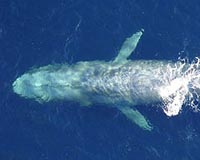| . |  |
. |
Portland, Ore. (UPI) Feb 26, 2009 Whaling contributes to global climate change, U.S. scientists have found. A century of commercial whaling has released around 100 million tons of carbon dioxide into the atmosphere -- that's equivalent to burning more than 50,000 square miles of temperate forest or 128,000 large sport-utility vehicles driving for 100 years. Those are the findings of a study by U.S. scientists from the Gulf of Maine Research Institute unveiled by Andrew Pershing from the University of Maine at the Ocean Sciences meeting this week in Portland, Ore. Whales, which Pershing says are the "forests of the ocean," store carbon in their bodes and the gas can be released when they are killed. "Whales, like any animal or plant on the planet, are made out of a lot of carbon," Pershing was quoted as saying at the conference by BBC News. "And when you kill and remove a whale from the ocean, that's removing carbon from this storage system and possibly sending it into the atmosphere." A large blue whale stores around 9 tons of carbon -- only large trees store more of the greenhouse gas scientists say is responsible for global warming. When a whale dies of natural causes, its body sinks to the seabed, transporting the carbon stored in it to the deep sea, away from the atmosphere for hundreds of years. Harpooning one, however, can release the carbon directly into the atmosphere, thus intensifying climate change. While the amount of carbon released by commercial whaling remains small, allowing whale populations to grow -- and thus to sequester more greenhouse gases -- could protect the climate in a way reforestation schemes do. Pershing at the conference proposed to put a price on carbon released from whaling or fishing (large fish also store carbon, which can be released by commercial fishing, he said). Under this scheme, cutting down on whaling or fishing could earn a country carbon credits that it could sell on the global carbon market. "The idea would be to do a full accounting of how much carbon you could store in a fully populated stock of fish or whales, and allow countries to sell their fish quota as carbon credits," he was quoted by the BBC as saying. "You could use those credits as an incentive to reduce the fishing pressure or to promote the conservation of some of these species." Commercial whaling, which dates to the 17th century, nearly eradicated global whale populations after nations killed up to 50,000 whales per year from the 1930s onward. The International Whaling Commission in 1986 introduced a moratorium on commercial whaling so that stocks might recover but whaling remains controversial.
Share This Article With Planet Earth
Related Links Follow the Whaling Debate
 Whaling plan would OK hunts but seek fewer kills
Whaling plan would OK hunts but seek fewer killsTokyo (AFP) Feb 24, 2010 The global body that regulates whaling has proposed giving the green light to Japan to keep hunting the sea mammals in return for reducing the number of animals killed. Greenpeace and the World Wide Fund for Nature harshly condemned the draft plan which aims to unlock stalled talks when the 85-nation International Whaling Commission (IWC) meets next month in Florida. While Greenpeace cal ... read more |
|
| The content herein, unless otherwise known to be public domain, are Copyright 1995-2010 - SpaceDaily. AFP and UPI Wire Stories are copyright Agence France-Presse and United Press International. ESA Portal Reports are copyright European Space Agency. All NASA sourced material is public domain. Additional copyrights may apply in whole or part to other bona fide parties. Advertising does not imply endorsement,agreement or approval of any opinions, statements or information provided by SpaceDaily on any Web page published or hosted by SpaceDaily. Privacy Statement |